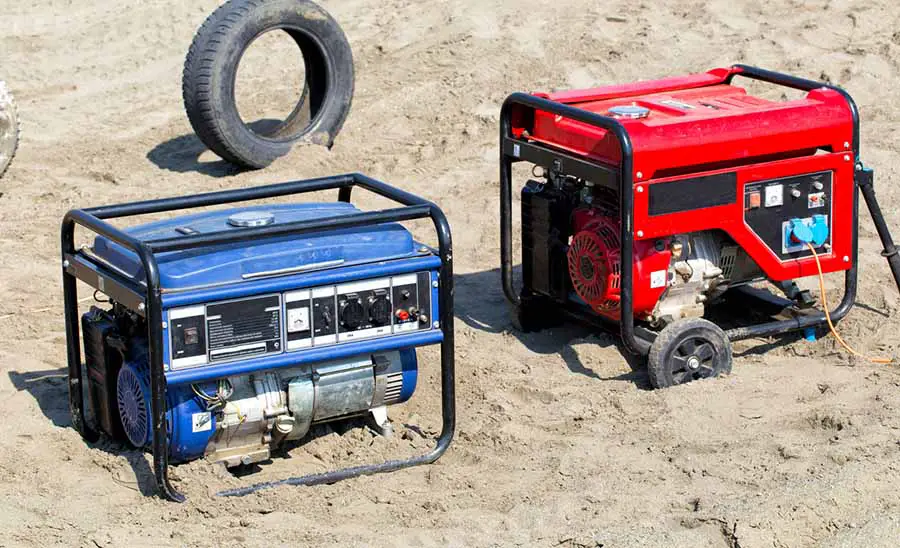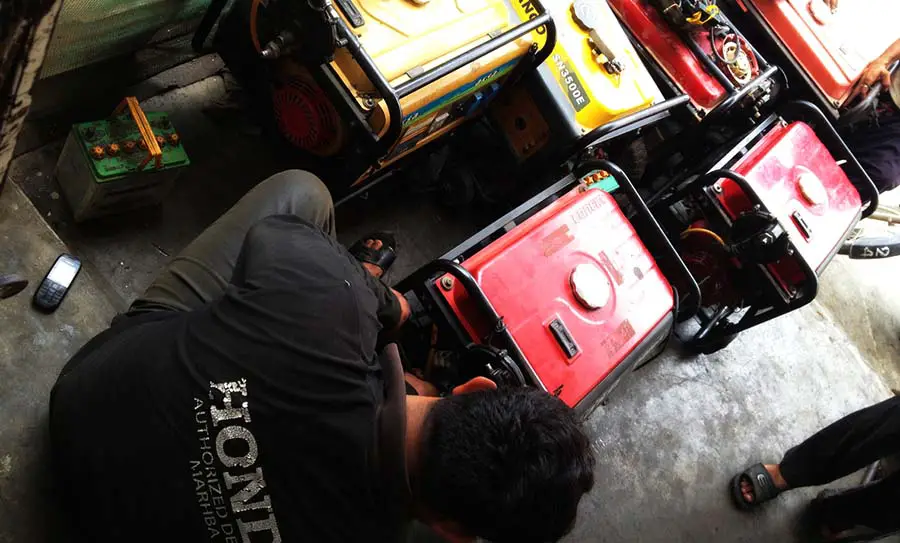
The cost of running a generator depends mainly on the type of fuel it uses. Compared to electricity from the grid, generators are more expensive power sources. However, power grids are aging and becoming more unreliable due to growing demand. The increase we see in severe weather events also means that blackouts are more likely.
It costs roughly $2.50 per hour to run a gas generator and nearly $9 to run a propane generator per hour. The price for running a generator does not include maintenance costs, which usually total around $100 per year. Generator power is costlier than grid power, but it’s excellent for emergencies.
How Much It Costs to Run Every Type of Generator
Generators use a wide variety of fuels, and some can run on more than just one type. The running costs depend not only on the kind of fuel they use but also the generator’s amount of power. The larger the generator, the higher the expense, but the power output is higher too.
When looking at the expense of running a generator, you need to factor in the size of the generator you need based on its output. People often make the mistake of buying generators that are too small to run essential household appliances such as stoves, refrigerators, and freezers at the same time.
The fuels used for generators are:
- Gasoline
- Propane
- Diesel
- Natural Gas
The fuel consumption rate depends on the generator brand, the weather conditions, the electrical output, and the fuel type. Let’s look at each type of generator and how much fuel and money it takes to run it.
Gasoline Fuelled Generators
Gasoline is the fuel most commonly used by portable backup generators. The price of gas varies by region, but you can easily find out what it costs. Generator manufacturers publish information on fuel consumption for the different generators they offer, and if you already have a generator, the operating manual will give you the details.
A gasoline generator’s power output determines the fuel consumption, and modern generators offer low fuel or half-load running modes. A standard five-kilowatt generator will usually use around 0.75 gallons an hour.
Inverter generators are more economical than other gasoline-powered generators. A 5000-watt generator can run on around one gallon per hour. This type of generator can electronically throttle the engine up or down as electricity demand varies.
Standard gasoline generators run full tilt the whole time, irrespective of the power demands placed on them. This is why they are not as fuel-efficient as inverters. When switched on, they generate a set amount of power whether you use it all or not.
The inverter generator’s improved efficiency means you won’t have to fill up the tank as often. Inverter generators also produce lower emissions and are not nearly as noisy. These generators are more mechanically complex than standard gasoline generators and so tend to be more expensive.
Propane Fuelled Generators
Propane is another fuel used by backup generators, but it can also power larger standby generators to supply the entire home or business with electricity.
Propane generates less energy than gasoline or diesel, but it is cleaner and safer to use. It burns more quickly than petrol and so might cost a bit more to run over short periods. For long-lasting power outages, a propane generator is the better choice.
A portable, 20-kilowatt generator burns about 3.45 gallons per hour, equalling around 83 gallons per day. It is cheaper if you have an extensive on-site propane tank because you can buy it in bulk. A 22-kilowatt backup generator, which comes on automatically when the power fails, will use approximately 3.6 gallons an hour on full load.
Propane generators are usually very reliable, start quickly and run more quietly than gasoline and diesel generators. They are also more eco-friendly as their emissions are colorless and almost odorless.
Propane has more than double the energy of natural gas. Unlike propane, a township often delivers natural gas to its residents’ homes via a pipeline. In many cases, propane is less expensive than natural gas, is more portable, and is widely available.
Generator engines run longer and better on propane than on natural gas and use half the fuel. This reduces maintenance costs. Propane is cleaner-burning than natural gas, and the generators are usually quieter too.
Diesel Fuelled Generators
You can also use diesel generators as backup units for emergency power supply. They are available in single and three-phase options, and you can use them in large establishments, homes, and small offices. Around 95% of generators used by commercial buildings and critical facilities are powered either by diesel or natural gas.
If the fuel price is $3.17 a gallon, a 20-kilowatt diesel generator capable of powering larger equipment such as HVAC, water heaters, and well pumps consumes about 1.6-gal per hour, around $122 per day.
However, diesel generators don’t work well or start that quickly in freezing temperatures, so it’s something to consider. Backup generators are sturdier and more reliable than those fuelled by gasoline, and their maintenance costs are also lower. Their engines also have a longer lifespan.
Diesel fuel has a limited shelf-life, and you shouldn’t use it after more than a year. Long-term diesel storage results in microbial growth, clog filters, pipes, and fuel injectors, leading to increased maintenance costs.
The purchase price of diesel generators is higher than gasoline generators, and they are also more expensive because diesel costs more. However, diesel has a higher energy density than gasoline, so a diesel generator is more fuel-efficient because you get more energy out of it per gallon of fuel used.
Natural Gas Generators
Natural gas generators are an efficient and widely used method of generating electricity. It’s one of the most affordable and effective fuels for power generation. Natural gas should not be confused with propane, another gas that is used for power generators.
Both propane and natural gas can come in gas bottles, but their energy content is very different. Another name for Propane is Liquid Petroleum Gas or LPG because it comes in liquid form in the cylinder. Natural gas is methane. They differ considerably in their chemical composition.
A fully loaded RS 20 generator will consume 122 cubic feet of propane per hour. The same generator fueled by natural gas will consume 245 cubic feet of gas per hour. There is also a 15 percent reduction in a generator’s power output using natural gas compared to one on propane.
Natural gas is available to consumers through pipelines and cylinders. Natural gas generators are commonly used in cities where it is piped directly into homes. Using natural gas to power a generator is cleaner, less expensive, and very efficient compared to gasoline and diesel generators.
Natural gas is more readily available in large cities than in outlying areas. Because it is piped in, fuel storage is not a problem. However, these pipelines can be disrupted by severe weather, earthquakes, and power outages. Ironically this is when you need a generator the most.
Generators Have Maintenance Costs

Apart from fuel costs, generators also have maintenance costs. Naturally, the type of generator you use makes a difference. Propane and natural gas generators tend to have lower maintenance costs than diesel and gasoline generators, where filters, pipes, and other parts need regular replacement.
Diesel generators are usually cheaper to maintain than gasoline generators, but they cost more upfront.
Generator manufacturers offer service plans that cost between $150 and $300 per year. Portable generators’ maintenance costs can be between $100 and $300 a year.
Not Having a Generator May Be More Expensive
Lack of power can shred a household budget completely. The U.S. Department of Energy estimates that power outages cost American households around $150 billion a year.
Food spoils in refrigerators and freezers, sump pumps can’t keep water out of basements, boreholes can’t get water into the home, cell phones can’t charge, and tech doesn’t work.
In cold climates, heating availability may be a matter of survival, especially for the elderly who can’t relocate to a hotel or relative’s house easily. If you or a family member has a medical condition whose treatment requires electricity, the need for an uninterrupted power supply could be critical.
Conclusions
Generators can be expensive to run, but these costs must be measured against other expenses that accompany power outages. When working from home, you may not be able to afford downtime on computers, the internet, and other equipment. Running a generator may not be as expensive as it initially appears.

